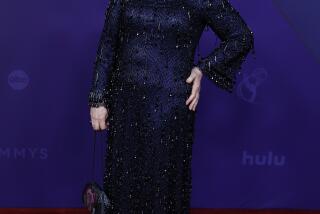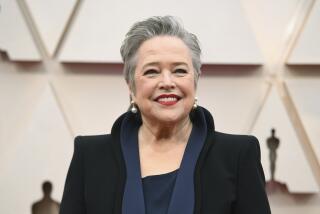Alan Bates, 69; Actor Who Won 2 Tonys Was Nominated for an Academy Award
British stage and screen star Alan Bates, who came to fame during England’s era of the angry young man, died Saturday. He was 69.
The actor, who had been battling pancreatic cancer for nearly a year, died in a London hospital late Saturday night with his son Ben and brother Martin by his side, his agent Rosalind Chatto announced Sunday.
According to the Bates Archive website, Bates learned he had cancer in January during a checkup and began chemotherapy immediately. He continued to work even after he was diagnosed, filming the upcoming USA miniseries “Spartacus” during a break in his therapy.
A famously private man, he asked those around him not to talk of the illness. He made his last public appearance in October, when he cut a ribbon at a new arts center in Suffolk, England. According to his website, he took a turn for the worse in late November and was hospitalized in mid-December.
Glenda Jackson, now a member of Parliament, starred with Bates in the 1970 film “Women in Love,” in which he and Oliver Reed raised more than a few eyebrows with an erotically tinged nude wrestling scene. Jackson told Sky Television after Bates’ death that he was not afraid to take risks.
“The longer he lived, the better an actor he became,” said the actress, who won an Oscar for the adaptation of D.H. Lawrence’s novel. “As he matured as an individual, his acting became broader and deeper, and he always brought the unexpected to everything he did.”
The eldest of three brothers, Alan Arthur Bates was born in the central English town of Allestree, Derbyshire. His father was an insurance broker, his mother a housewife. Both were amateur musicians who wanted their son to become a concert pianist.
By the age of 11, Bates had other ideas. “I just up and said I wanted to be an actor,” he said in a 1963 interview with Seventeen magazine. His parents replaced his piano lessons with speech lessons. He attended the Herbert Strut Grammar School in Derbyshire and the Royal Academy of Dramatic Arts in London. His training, though, was interrupted by two years’ service in the Royal Air Force.
Bates made his stage debut in 1955 at Coventry with the Midland Theatre Company and then joined the English Stage Company, a London repertory group that was based at the Royal Court Theatre. It was there that he got his first big break in the 1956 drama “Look Back in Anger.” John Osborne’s gritty play, which began the British theater’s foray into the world of “angry young men,” examined the angst and anger of post-World War II males.
Over the decades, Bates became a favorite of several of the modern era’s notable playwrights, including Harold Pinter, Simon Gray, Peter Shaffer and Tom Stoppard. In the mid-1980s, he appeared at the Ahmanson Theatre in a revival of Osborne’s drama “A Patriot for Me.”
Bates, along with the likes of Albert Finney, Richard Harris and Tom Courtenay, also found success in England’s flourishing film industry. He made his film debut opposite Laurence Olivier in 1960 in Tony Richardson’s version of Osborne’s “The Entertainer.” And he got his first starring role in Bryan Forbes’ acclaimed 1961 drama, “Whistle Down the Wind,” in which he played an escaped murderer who a group of children believe is really Christ.
The choice film roles continued throughout most of the 1960s and early ‘70s, with “A Kind of Loving” (1962), “Nothing but the Best” (1964), “Zorba the Greek” (1964),”Georgy Girl” (1966) and “The Go-Between” (1971).
He received his single Academy Award nomination for best actor for his performance as a Russian Jewish handyman unjustly accused of a crime in 1968’s “The Fixer,” based on the novel by Bernard Malamud.
Bates’ film and television roles never kept him away from the theater for long, however. In 1971, he was the toast of the London theater in Gray’s play “Butley” for his portrayal of an acerbic teacher. He repeated this triumph in New York in 1972 and won his first of two Tony Awards. In 1974, he reprised the role for the movie version.
Though his earlier films were made in England and Europe, Bates came to America in the late ‘70s to appear as the hunky painter who sweeps Jill Clayburgh off her feet in 1978’s “An Unmarried Woman” and as Bette Midler’s character’s opportunistic manager in 1979’s “The Rose.”
Although Bates was considered a national treasure, some British critics complained that he didn’t do enough classic stage roles. Bates was quick to reply to such criticism: “When you have Harold Pinter and Simon Gray sending you scripts, it’s hard to say no.”
Bates’ private life had its share of tragedy. In 1990, his 19-year-old son, Tristan, died of an asthma attack in Tokyo. Two years later, his grieving wife of 23 years, actress Victoria Ward, also died.
Bates conceded that it took him three or four years after their deaths to even manage a smile. Talking about how he coped with the double loss, he once said: “Well, you do either collapse or carry on. You have to draw strengths from those who have gone. You go through a trough of bewilderment. It’s physical as well as an emotional loss. For a year or two, you think they are going to come through that door. You could get on the edge of, well, madness.”
But despite personal tragedies, Bates continued to act. And the last few years had been golden for him. He was one of the stars of Robert Altman’s acclaimed 2001 drama, “Gosford Park,” and he returned to Broadway after a nearly 30-year absence in April 2002 in Ivan Turgenev’s “Fortune’s Fool,” for which he received his second Tony Award for best actor.
Last year, he appeared in the films “The Sum of All Fears” and “The Mothman Prophecies,” and he can currently be seen in director Norman Jewison’s “The Statement.”
Bates was appointed a Commander of the British Empire in 1995 and was knighted this past March. He is survived by his son, two brothers and a granddaughter.
More to Read
The biggest entertainment stories
Get our big stories about Hollywood, film, television, music, arts, culture and more right in your inbox as soon as they publish.
You may occasionally receive promotional content from the Los Angeles Times.











